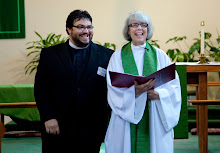In Evangelical Lutheran Worship there are a few commemorations extended to musicians who have been instrumental parts of hymnody and music in the church. Let us look at what they have done and contributed.
Charles Wesley (March 2) – Hymns: the Advent hymn No. 254 Come, Thou Long-Expected Jesus; the ever popular Christmas hymn No. 270 Hark! The Herald Angels Sing; he also wrote the fourth verse to Easter Hymn No. 365 Jesus Christ is Risen Today and No. 373 by the same title written entirely by him; a Christ the King Hymn, No. 430 Rejoice, for Christ is King; No. 435 Lo! He Come with Clouds Descending, a hymn about the second coming of Christ; a morning hymn No. 553 Christ, Whose Glory Fills the Skies; No. 631 Love Divine, All Loves Excelling often set to the tune HYFRYDOL, a perennial favorite; No. 825 You Servants of God; and certainly the most well know hymn by him, No, 886 O, for a Thousand Tongues to Sing.
Nicholaus Ludwig von Zinzendorf (May 9) – Hymn No. 624 Jesus, Still Lead On, a hymn from the height of Lutheran Pietism.
Jiří Třanovský (May 29) – Hymn No. 602 Your Heart, O God is Grieved. While not well know, this is a most excellent hymn for confession and forgiveness.
Johann Sebastian Bach, Heinrich Schütz, and George Frederick Handel (July 28) – Hymns harmonized by Bach: No. 310 Songs of Thankfulness and Praise, No. 351 O Sacred Head, Now Wounded, No. 405 O Spirit of Life, No. 480 O Bread of Life from Heaven, No. 501 Come with Us, O Blessed Jesus, No. 606 Our Father, We Have Wandered, No. 703 O God, Why Are You Silent, and No. 876 Let the Whole Creation Cry. Handel wrote the tune the hymn No. 376 Thine is the Glory. All three of these men wrote numerous sacred compositions including cantatas, motets, oratorios, and the like.
Philipp Nicolai, Johann Hermann, and Paul Gerhardt (October 26) – Nicolai wrote some of the most well known hymns in the Lutheran tradition including the King and Queen of chorales: No. 308 O Morning Star, How Fair and Bright! and No. 436 Wake, Awake, for Night is Flying. Also he wrote the tune for No. 786 O Holy Spirit, Enter in. Gerhardt wrote a fair few hymns: No. 241 O Lord, How Shall I Meet You, No. 273 All My Heart Again Rejoices, No. 340 A Lamb Goes Uncomplaining Forth, his most popular text, the Passion hymn No. 352 O Sacred Head, Now Wounded, No. 378 Awake, My Heart, with Gladness, No. 568 Now Rest Beneath Night's Shadow, No. 761 Evening and Morning, and No. 788 If God my Lord Be for Me.
Issac Watts (November 25) – Hymns: No. 267 Joy to the Word, No. 337 Alas! And Did My Savior Bleed, No. 434 Jesus Shall Reign, No. 625 Come, We That Love the Lord, No. 632 O God, Our Help in Ages Past, No. 772 Oh, That the Lord Would Guide My Ways, No. 782 My Shepherd, You Supply My Need, No. 803 When I Survey the Wondrous Cross, No. 847 Come, Let Us Join Our Cheerful Songs, and No. 848 Give to Our God Immortal Praise!
John of Damascus (December 4) – Hymns: No. 361 The Day of Resurrection! and No. 363 Come, You Faithful, Raise the Strain, both Easter hymns.
There is also a commemoration for Catherine Winkworth and John Mason Neale (July 1) who translated many hymns.
These are just a few of the many hymn writers that make up modern hymnody.
